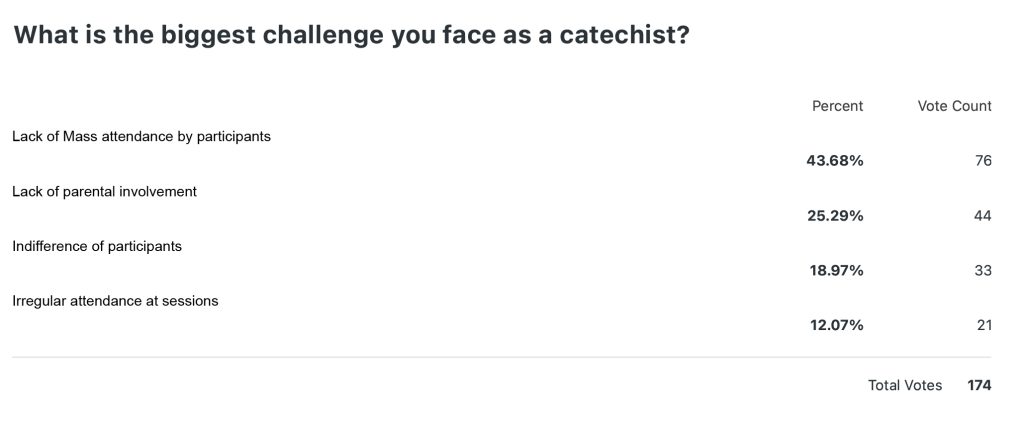
We catechists find great joy in our ministry; however, we also face many challenges! For that reason, it is good to know that we are not alone in facing challenges. Many of our fellow catechists face similar situations and circumstances. Take a moment, if you will, to participate in the poll below, which invites you to identify the greatest challenge you face right now as a catechist. Feel free to elaborate in the “Leave a Reply” space below, and be sure to check back to see the results. Thanks for participating!




My greatest challenge as a 2nd grade catechist is trying to teach children who are unchurched. It’s difficult to prepare them for the sacraments when most do not attend Mass or have the slightest idea what Communion is. Many don’t even know what a priest is.
All too true, Diana, as you can see from many of the comments. Hopefully, your parish will begin to devise some faith formation opportunities that include family catechesis so that parents can get more involved.
All of these are enormous challenges. The mindset that has nurtured and limited parental participation and responsibility exists within and out of the Church. Preparing children who have no concept of the sacraments or who don’t witness the vitality of them in their families creates a disconnect.
Well said, Angela. Thanks for sharing.
I’ve stopped going to mass due to not being able to understand it. I go to the English speaking mass which is done by a Spanish or polish priest. And can’t understand a word. So I stay home and watch it on tv. It’s very disappointing.
Thanks for sharing, Caroline. That sounds frustrating. I would gently encourage you to attend in person, knowing that you know all of the prayers even if they’re hard to understand and perhaps you can bring a printout of a homily that you find online to read during the actual homily if the priest is too hard to understand. At least this way you can still receive Holy Communion and be a part of the faith community.
All 4 of these options are equally problematic. Everything comes before CCD classes – the parents are not on board – they don’t attend Mass, therefore, their children are not attending Mass. I’m currently teaching THREE third grade students who missed last year’s class (sacramental second grade year) simply because they didn’t want to come. These 3 third graders coming in this year did not know their prayers, did not have any kind of knowledge of God, do not know any bible stories – it’s a challenge when I only have 1 hour per week to make an impression on them. It’s overwhelming.
Indeed, Mary, it is overwhelming and yet, it is the reality we are dealing with as you can see from so many other responses. Thank you for your perseverance and for doing all you can to assist and support families and bring them closer to Jesus.
Lack of parent support. Getting their kids to Mass, class, turning in assignments, etc.
Thanks for sharing, Teri!
All the choices ARE challenges! We live in a very secular world where families are very busy and have many challenges (emotional, financial, health). Our goal is to help as many as we can to become a domestic church where all its members grow and deepened their relationship with God. I do take comfort knowing, that with God’s help anything is possible. I recall St. Oscar Romero saying: “… We cannot do everything, and there is a sense of liberation in realizing that. This enables us to do something, and to do it very well. It may be incomplete, but it is a beginning, a step along the way, an opportunity for the Lord’s grace to enter and do the rest. We may never see the end results, but that is the difference between the master builder and the worker. We are workers, not master builders; ministers, not messiahs. We are prophets of a future not our own.”
Thank you!
Thanks Maria! I especially love the Romero quote…soooo helpful!
I have been teaching PSR for 50 years, 2nd grade since 1980. As the years have gone by I see less parent involvement and less Mass attendance. I send weekly emails to my parents about what they did in class, encouraging to look up the Bible stories as a family, set up a prayer corner, prayer partners and encouraging the children to pray in the morning and at night. At night having them get into a habit of reviewing the day, saying I am sorry and then saying the Act of Contrition. Some do but most don’t.
Wow, Rosemary, 50 years! God bless you for your selfless service! You are doing all the right things and doing as much as anyone could possibly ask. We are struggling against some realities that are way beyond our control, so don’t feel bad. Keep up the wonderful work and thanks again for such dedication!
Each of the options and more apply. Absenteeism, lack of parental involvement, poor attendance at Mass (if any), too many extracurricular school activities conflicting with RE classes, students not participating because they are too tired or do not feel religious education is important or necessary except when they are preparing to receive sacraments.
Have taught for many years and reasons have not changed. Parents are supposed to be the first teachers but are not due to their lack of being an example by attending Mass, receiving the sacraments, encouraging their children about the importance of following Jesus during their journey of Faith!
Thanks for sharing, Theresa. It can indeed be frustrating but thanks for your perseverance!
I think it is a matter of encouraging Families to bring their children to Mass. It seems that Wednesday Nights are the only “Religion” night. Parents and Families do not go to Mass, but they want their children to go receive their First Eucharist as a “mini wedding.” I do not understand what the point of First Eucharist is if you are not going to bring your child to Mass ever again.
Thanks for sharing, Darby. It is indeed frustrating at times. I’ve been telling parents more and more that we come to Mass because we are “broken” and unfulfilled and that we cannot heal ourselves…at our deepest level, we are incapable of sustaining ourselves. We rely on God who “comes to us” in the Eucharist. It is parallel to the reason a person goes to twelve step meetings: healing is reliant on an admission of brokenness and reliance on a “higher power.” I half facetiously tell parents that, when their kids ask, “why do we have to go to Mass?” that their reply should be, “Because mommy and daddy are broken. And so are you. Get in the car.”
Indeed, being a catechist/DRE can be a frustrating, disheartening experience at times (sometimes a lot of the time). I hear that loud and clear in the comments above, and my heart aches for you all. (And for myself at times, too!)
Parents being their children’s primary educators in the faith is an ideal that often appears to be unrealized in many families. As catechists, we can’t change minds and hearts by fighting, though it often feels like that is what we have to do.
I often think of the rich young man walking away from Jesus after Jesus called him to follow him, and how sad Jesus probably felt about that. But we don’t know the sequel to that passage…did the rich young man come back to Jesus eventually?
I do feel frustrated when it seems like the message of the Good News which we strive so enthusiastically and sincerely to share seems to fall in deaf ears and distracted hearts and minds. There are many idols in our current culture competing for the hearts and souls of God’s people.
After many years as a catechist and DRE, I have come to these conclusions about what God calls me to do:
1) Speak gently but firmly and often the truth about the primacy and necessity of our gathering each week for the celebration of Eucharist. It is the most important thing we do as Catholics. In every communication I send or speak to parents, I remind them of that. Many will ignore, but perhaps a few will consider and make an effort to participate in Mass more than just at Christmas and Easter.
2) Encourage, encourage, encourage them to find the nourishment, comfort, love Jesus offers in Eucharist.
3) While the children/youth are at PREP, strive to make the experience one at which they know they are welcomed, loved by God and a valuable part of the Church community. Give them a positive experience of Church. They may not remember the Corporal Works of Mercy, but they will remember the experience of feeling loved by God through us.
4) Live in hope. Offer those good, sincere efforts we are all making (and I have no doubt that that is true for every catechist- why else would we do what we do?) at the end of each session and let God do his work. His power and love is greater than we can ask or imagine. Pray for the little ones entrusted to our care. I’ll bet Jesus prayed for that rich young man.
5) Give them a moment at every session to listen to God speak in their hearts. We begin each session with a “BCoG” (Beloved Child of God) Moment. After opening announcements, we make the Sign of the Cross, and I say, “Listen as God speaks in your heart. He calls you by name and says, ‘You are my beloved child; in you I am well pleased.'”
And listen yourselves as He says that to each one of us, along with his words, “Well done, good and faithful servants.” God thanks you for your/our efforts, I’m sure. Keep hoping, keep praying, keep catechizing, all! You are not alone. We’re all in this together, and above all, God will not abandon us!
Thanks, so much, Christina, for your heartfelt sharing, your wisdom, and your encouragement! Your thoughts and comments will benefit MANY catechists who are struggling to feel a sense of “making a difference.”
Thanks for your words, Christina. It helps to remember that Jesus was probably also frustrated when He told the parable of the seeds falling on rocky ground. And I can’t imagine what St. Paul went through. At least I only have to teach 2nd graders and not some darned Galatians!
I live in the Middle East and faith formation is taken very seriously. I teach Grade 5. Parents involvement is around 85%, however, some do not encourage their children to attend mass. My challenge is I preach/teach more than I practice. I feel like a pharisee! I’m passionate about teaching and love the kids. Help!!
Thanks for sharing your experience with us, Hyacinth! It’s important for all of us to know how experiences compare in different parts of the world when it comes to faith formation. I know that here in the U.S., many Catholics who live in the South, which is very evangelical Protestant, take their faith formation very seriously because they are so often challenged by their neighbors. As for feeling like a Pharisee, continue to pray to the Holy Spirit to guide you to a deeper discipleship…your love for the kids is in the right place (and that is NOT pharisaical!)
I love Diana’s comment! It’s important to keep a sense of humor in it all! Sometimes I take myself too seriously, and yes, things could always be worse!
Very true, Chrstina!
I agree with what was reported in the poll. For me the biggest challenge is families not attending Mass.
Thanks, Jan…yes, that is one of the biggest frustrations.